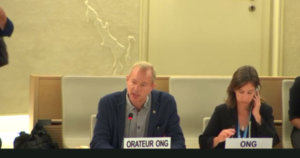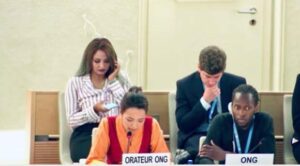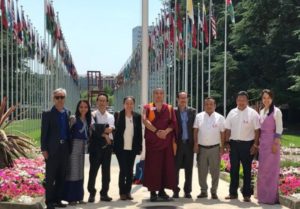China’s human rights abuses have been raised by the European Union and other European member states at the ongoing 41st session of the United Nations Human Rights Council in Geneva, the Central Tibetan Administration (CTA) reports.
The CTA report the EU statement not only called on China to respect human rights, but also expressed grave concern regarding their handling of human rights defenders who have been trialled and detained. Other individual member states echoed this, with Germany and the Czech Republic calling upon China to release all human rights defenders.
According to the report France referred to human rights abuses in Tibet and Xinjiang as a “worrying situation” and the German delegate regarded discrimination against the predicament of Tibetans and Uyghurs as “deeply disturbing”. There was also deep concern over “widespread surveillance and profiling based on ethnicity”. The International Campaign for Tibet report that their EU policy director, Vincent Metter, spoke at the session’s general debate on behalf of the International Campaign for Tibet, saying that the surveillance system strives to eradicate Tibetan identity and isolate it from outside scrutiny. He stressed the importance of continuing to pursue human rights in Tibet in order to address this isolation and the attempts by China to silence Tibetans.

Vincent Metten, EU policy director of the International Campaign for Tibet at the UN Human Rights Council in Geneva.
Photo: ICT
Mr Metter spoke at a session hosted by the Society for Threatened Peoples and gave an overview of human rights violations in Tibet. This included China’s attempts to “sinicise” [bring under Chinese control] religious matters for political purposes, the lack of religious freedom, and interference in the reincarnation of the 14th Dalai Lama. Mr Metter also stated that, in accordance with article 36 of the Chinese Constitution and international human rights law, China should respect all religions.
The Tibet Journal report that Mr Metter concluded by calling for member states to: urge China to respect religious, belief and cultural freedom; urge prompt and unfettered access for independent human rights experts to all parts of the country, including Tibetan areas; demand the release of all human rights defenders.

Kunchok Yaklha speaks about China’s repression of Tibetans at the UN Human Rights Council in Geneva.
Photo: UN Web TV
Kunchok Yaklha, representative for The Society for Threatened Peoples, also spoke at the general debate. She referred to the “ongoing concerns of China’s use of surveillance technology” and a “highly repressive regime against religious minorities”. Her address was interrupted on several occasions by the Chinese delegation on points of order, which asked her not to use “abusive” language. However, the ICT report that the Vice Chairman allowed Ms Yaklha to complete her statement.
The plight of the Uighurs in East Turkestan (Xinjiang in north west China) was discussed at the Council, with 22 countries signing a joint letter criticising China’s treatment of the Muslim minority Uighurs. China is understood to be holding about one million Uighurs and other Muslims in detention camps, claiming they are being educated in a bid to stop extremism. China claims that Uighurs are being educated in “vocational training centres” designed to combat extremism.





 Print
Print Email
Email